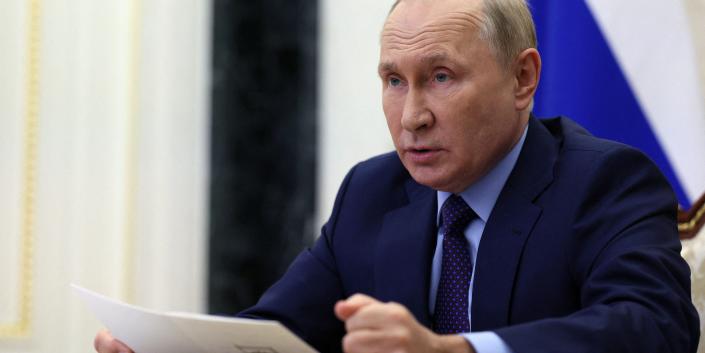
-
A Russian nuclear attack would “almost certainly” trigger a military response from Kyiv’s friends, a senior NATO official said.
-
There would be “unprecedented consequences” should Putin turn to nuclear weapons, they said, per Reuters.
-
The official said NATO itself might even be led to respond.
Any nuclear weapons attack by Russia in its war with Ukraine would “almost certainly” trigger a military response from the eastern European country’s friends, a senior official from the North Atlantic Treaty Organization reportedly said on Wednesday, possibly referencing countries like the US, among others.
There would be “unprecedented consequences” should Russian President Vladimir Putin turn to nuclear weapons, the unnamed NATO official said, according to Reuters.
A Russian nuclear attack would “almost certainly be drawing a physical response from many allies, and potentially from NATO itself,” the official warned.
Putin has repeatedly threatened that all elements of Russia’s military power, even nuclear weapons, are on the table as he escalates his unprovoked invasion of Ukraine.
When Putin announced plans to partially mobilize hundreds of thousands of reservists to beef up Moscow’s forces in the Russian president’s fight with Ukraine, which has not at all been going according to plan, he again threatened the use of nuclear weapons.
“If the territorial integrity of our country is threatened, we will certainly use all the means at our disposal to protect Russia and our people,” the Russian leader said. “This is not a bluff.”
The NATO official said that Putin was using the threats of nuclear weapons as a way to discourage NATO countries, which have been providing billions of dollars in weaponry and other aid to Ukraine through its fight with Russia, from directly engaging in the conflict.
Earlier this month, Rolf Mowatt-Larssen, a former CIA Moscow station chief, said it would be “terribly irresponsible” of Western leaders not to take Putin’s threats of nuclear warfare seriously.
CIA Director William Burns recently said it was “hard” to tell whether Putin was bluffing about his willingness to use nuclear weapons, but the Biden administration is, nonetheless, watching the situation carefully.
The Biden administration has privately warned Russia there would be “catastrophic consequences” if a nuclear weapon is employed in Ukraine, but the US has not offered specifics on precisely how it would respond to such a scenario.
During an interview on Tuesday, CNN’s Jake Tapper asked President Joe Biden what the “red line” is for the US and NATO. Tapper also questioned the president as to whether he’s “directed the Pentagon and other agencies to game out what a response would be if [Putin] did use a tactical nuclear weapon or if he bombed the Zaporizhzhia nuclear power plant in Ukraine or anything along those lines.”
“There’s been discussions of that, but I’m not going to get into that,” Biden said in response. “It would be irresponsible of me to talk about what we would or wouldn’t do.”
Rose Gottemoeller, a former senior State Department official for arms control and nonproliferation issues, and former deputy secretary general of NATO, said during a webinar on Tuesday hosted by the the Arms Control Association that if Russia uses a nuke in Ukraine, the US and its allies should not respond with a nuclear attack.
“I do not believe that a nuclear response is something that the United States and its allies should be placing on the table. We need to stay on the side of perhaps a firm military response, but one that would stay conventional in nature,” Gottemoeller said, going on to suggest that the US could respond by targeting the area where Russia’s nuclear attack originated from.
“Any such attack would be carefully designed to be proportionate and to be responsive to what would be an egregious attack on a Ukrainian target using a nuclear weapon,” Gottemoeller added. “And second, I want to stress and really underscore that none of these options for military action are desirable to NATO or to the United States of America.”
Read the original article on Business Insider




